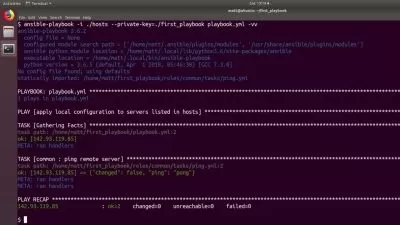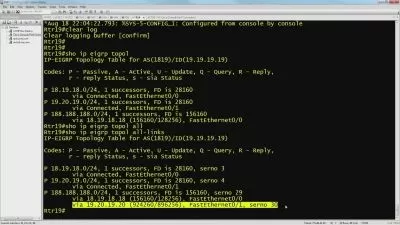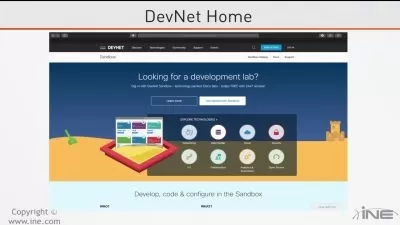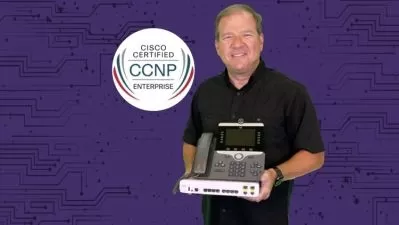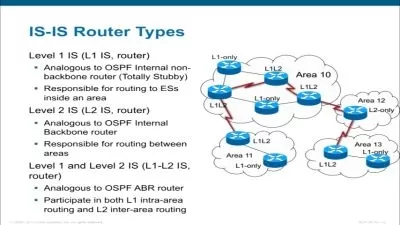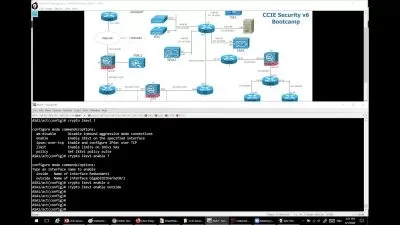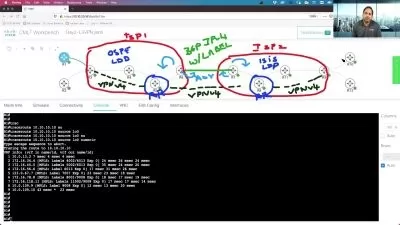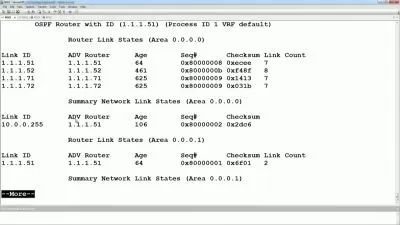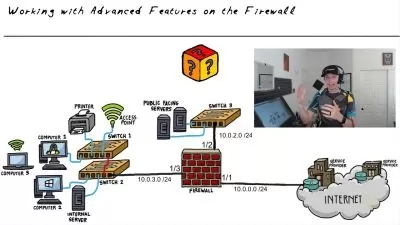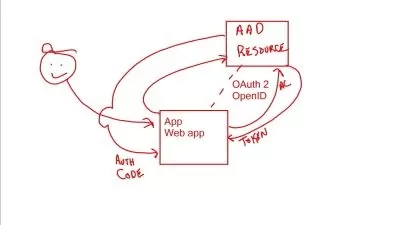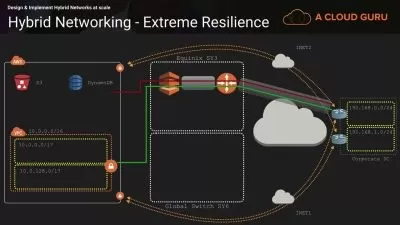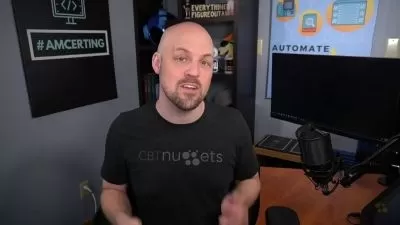Network Automation Packages
Focused View
55:23:36
159 View
00 - Introduction.mp4
16:14
01 - Webinar Structure and More Information.mp4
14:08
02 - Deploying Ansible in Production.mp4
02:57
02 - Introduction to Ansible Collections.mp4
14:13
A1 - Introduction to Ansible.mp4
23:28
A2 - Ansible Playbooks.mp4
22:19
A3 - Generating Configurations from Jinja2 Templates.mp4
13:29
Ansible Deeper Dive.pdf
Ansible Networking Modules - Command-Based Playbooks.pdf
Ansible Networking Modules - Connecting and Authenticating.pdf
Ansible Networking Modules - Declarative Configurations.pdf
Ansible Networking Modules - Executing Commands.pdf
Ansible Networking Modules - Getting Operational Data.pdf
Ansible Networking Modules - Managing Configurations.pdf
Ansible for Networking Engineers Index.pdf
Create a Simple Ansible Test Environment.pdf
Creating Reusable Code.pdf
D0.1 - Ansible Inventory Format.mp4
18:15
D0.2 - Inventory Variables and Sources.mp4
18:52
D1 - Ansible Variables.mp4
19:34
D1.1 - Inventory Variables Deep Dive.mp4
13:23
D1.2 - Play and Task Variables.mp4
09:48
D1.3 - Registered Facts and Extra Variables.mp4
11:06
D1.4 - Fact Caching and Troubleshooting.mp4
15:17
D1.5 - Special Variables.mp4
14:38
D2 - Play and Task Execution.mp4
10:04
D3 - Error Handling in Ansible Playbooks.mp4
06:27
D4 - Working with Files.mp4
17:59
D5 - Loops in Ansible Playbooks.mp4
21:10
D6 - Exotic Jinja2 Filters.mp4
10:41
D7 - Tracking Changes in Ansible Playbooks.mp4
13:21
D8 - Using Check Mode for Dry Runs.mp4
11:49
E1 - Extending Ansible.mp4
09:13
E2 - Dynamic Inventory and Hosts.mp4
10:15
E3 - Callback Plugins.mp4
09:05
E4 - Jinja2 Filters and Tests.mp4
20:51
Errata.pdf
Extending Ansible.pdf
J1 - Introduction to Jinja2.mp4
14:40
J2 - Complex Data Objects and Loops.mp4
22:15
J3 - Variables, Macros and Includes.mp4
09:59
J4 - Python Methods in Jinja2.mp4
06:08
J5 - IP Address Handling.mp4
13:49
J6 - Whitespace Handling in Jinja2.mp4
13:56
Jinja2 Hands-On Exercises.pdf
Jinja2 - Additions and Corrections.pdf
N0 - Networking Modules Introduction.mp4
11:10
N0.1 - Ansible Networking Modules Introduction.mp4
11:34
N0.2 - Generic Networking Modules.mp4
09:19
N1 - Connecting and Authenticating to Network Devices.mp4
15:20
N1.1 - Connecting to Network Devices.mp4
20:17
N1.2 - Authenticating Ansible User on Network Devices.mp4
14:47
N2 - Executing Commands on Routers and Switches.mp4
23:23
N2.1 - Executing Commands on Network Devices.mp4
25:08
N2.2 - Multi-Platform Command Execution.mp4
09:12
N3.1 - Collect Printouts.mp4
14:58
N3.2 - Check Software Version.mp4
09:08
N3.3 - Check Connectivity.mp4
08:52
NA1 - What Is NAPALM.mp4
19:10
NA2 - NAPALM Ansible Modules.mp4
14:33
NA3 - Fully-Automated Verification.mp4
11:25
NA4 - Hands-On Examples and Playbooks.mp4
15:53
NAPALM+Ansible Tutorial.pdf
NAPALM-validate.pdf
NC1 - Managing Network Device Configurations with Ansible.mp4
09:54
NC2 - Declarative Intent Modules.mp4
22:19
NC2.1 - Simple Configuration Changes.mp4
11:32
NC2.2 - Hierarchical Configurations.mp4
10:12
NC2.3 - Order-Sensitive Configuration Objects.mp4
10:12
NC3 - Deploying Configurations from Files.mp4
17:23
NC3 - Generic Configuration Changes.mp4
19:49
NC4 - Deploying Configuration Files.mp4
14:10
NC4.1 - Gathering and Comparing Configurations.mp4
12:14
NC4.2 - Replacing Configurations.mp4
06:31
NC4.3 - Saving Running Configuration.mp4
05:45
NC5.1 - Declarative Configuration Modules.mp4
15:14
NC5.2 - Improving Performance of Declarative Configuration.mp4
08:13
NS1 - Getting Operational Data from Network Devices.mp4
18:30
NS2 - Gathering Network Device Facts.mp4
18:21
NS3 - Get Structured Data with Show Commands.mp4
21:22
NS4 - Parsing Show Outputs.mp4
21:08
NV1 - Introduction to Deployment Validation with NAPALM.mp4
03:46
NV2 - NAPALM Validation Overview.mp4
12:21
NV3 - Using NAPALM-based Deployment Validations with Ansible.mp4
16:53
R1 - Play and Task Imports.mp4
12:27
R2 - Dynamic Task Includes.mp4
15:06
R3 - Ansible Roles.mp4
20:00
R4 - Importing and Including Roles.mp4
09:47
R5 - Ansible Collections.mp4
22:12
Registered Ansible Variables and Conditional Task Execution.pdf
Review Questions - Ansible Deep Dive.pdf
Review Questions - Creating Reusable Code.pdf
Review Questions - Executing Commands on Network Devices.pdf
Review Questions - Extending Ansible.pdf
Review Questions - Managing Network Device Configurations.pdf
Solutions for Jinja2 Hands-On Exercises.pdf
Solutions for YAML and JSON Hands-On Exercises.pdf
Use Jinja2 to Create Templates.pdf
Y1 - Introduction to YAML and JSON.mp4
15:54
Y2 - Scalar values in YAML and JSON.mp4
08:24
Y3 - Simple lists and dictionaries.mp4
09:44
Y4 - Complex Data Types.mp4
13:26
YAML and JSON Hands-On Exercises.pdf
errata-jinja2.zip
errata-network-overview.zip
features-errata-inventory.zip
features-errata-tasks.zip
features-extending.zip
1 - Introduction.pdf
2 - Using Git.pdf
3 - Manage Configurations with Git.pdf
4 - Create Custom Reports.pdf
5 - Create and Deploy Device Configurations.pdf
Lean Start into Network Automation.pdf
NETCONF and Yang.pdf
- 1. INTRODUCTION TO NETCONF AND YANG
- 1 - Introduction.mp405:43
- 2 - Where Did NETCONF and YANG Come From.mp409:11
- 3 - Where and Why Use NETCONF and YANG.mp408:11
- 3.1 - Hands-On- NETCONF Browser Pro with Junos.mp409:43
- NETCONF and YANG.pdf
- 2. NETCONF 101
- 4.1 - What Is NETCONF.mp407:18
- 4.2 - How NETCONF Works.mp405:41
- 4.3 - Hands-On- NETCONF over SSH with NX-OS and Junos.mp423:32
- 3. YANG 101
- 5.1 - What Is YANG.mp408:47
- 5.2 - Real-World YANG Example.mp406:35
- 5.3 - Hands-On- Python+Paramiko with Junos.mp411:10
- 5.4 - End-to-end YANG And NETCONF with Python And ConfD.mp420:55
- 4. CLOSING THOUGHTS
- 6 - Closing Thoughts.mp410:40
- 5. NETCONF DEEP DIVE
- 7.0 - NETCONF Protocol Basics.mp411:12
- 7.1 - Opening NETCONF Session.mp419:03
- 7.2 - Configuration and Operational Data.mp408:39
- 7.3 - NETCONF Datastores.mp410:34
- 7.4 - Basic Operations.mp408:35
- 7.9 - Questions and Answers.mp414:10
- NETCONF Deep Dive.pdf
- 6. NETCONF ON CISCO IOS
- NETCONF on Cisco IOS.pdf
- VI1.1 - Opening a NETCONF Session (Cisco IOS).mp409:50
- VI1.2 - Getting Operational Data (Cisco IOS).mp413:33
- VI1.3 - Getting and Editing Configuration (Cisco IOS).mp419:28
- 7. NETCONF ON JUNOS
- NETCONF on Junos.pdf
- VI2.1 - Getting Operational Data (Junos).mp409:04
- VI2.2 - Getting and Editing Configuration (Junos).mp413:44
Network Automation 101.pdf
Network Automation 101 Slides.pdf
Network Automation 101 (SINOG 3 Keynote).pdf
- 1..Introduction
- 1.1 - What is Network Automation.mp420:27
- 1.2 - Network Automation Roadblocks.mp407:42
- 2..Hierarchy of Network Automation
- 2.1 - Operated Network.mp414:07
- 2.2 - Abstraction of Network State.mp413:31
- 2.3 - Automated Provisioning.mp436:28
- 2.4 - Automated Remediation.mp413:06
- CLI-versus-API Resources.pdf
- Network Automation Data Model Optimization.pdf
- Overview of the 2002 IAB Network Management Workshop (RFC 3535).pdf
- Additonal Resources
- 3..Caveats and Questions
- 3.0 - Caveats and Questions.mp417:43
Network Automation Concepts.pdf
Roadmap.pdf
- III. Single Source of Truth
- ST1 - Network Automation Source-of-Truth.mp417:00
- ST2 - Building a Source-of-Truth.mp420:05
- Single Source of Truth.pdf
- Single Source of Truth Links.pdf
- II. Formatting, Describing, and Storing Data
- DM4.1 - Data Representation.mp418:56
- DM4.2 - Data Model Descriptions.mp415:32
- DM4.3 - YANG and OpenConfig.mp413:17
- DM4.4 - Data Stores.mp418:56
- DM4.5 - Selecting a Data Store.mp413:50
- IV. Network Infrastructure as Code Concepts
- IC1 - Overview.mp422:21
- IC2 - Deployment Process.mp418:46
- IC3 - Abstraction Layers.mp406:52
- IC4 - Using Software Development Methodologies.mp412:37
- Network Infrastructure as Code.pdf
- I. Data Models in Network Automation
- DM1.1 - Data Model Introduction.mp417:55
- DM1.2 - Data Model Introduction QA.mp408:53
- DM2.1 - Device-Level Data Models.mp415:33
- DM2.2 - Optimizing a Device-Level Data Model.mp417:53
- DM2.3 - Infrastructure and Services Data Models.mp411:40
- DM3.1 - Data Model Transformations.mp417:45
- DM3.2 - Data Model Transformation in Automation Workflow.mp423:31
- Data Models and Data Stores.pdf
- V. Intent-Driven Networking (2018 Edition)
- IN1 - What Is Intent-Based Networking.mp408:17
- IN2.1 - Device Configuration as Intent.mp413:47
- IN2.2 - Abstracting and Managing Device-Level Intent.mp419:34
- IN3 - Network-Wide Intent.mp423:21
- IN4 - Automated Remediation.mp418:52
- IN5 - Back to Reality.mp410:31
- IN6 - Questions and Answers.mp407:22
- Intent-Driven Networking and Data Models.pdf
Network Automation Tools.pdf
Roadmap.pdf
- 1. Open-Source Tools for Modern Networks
- I1 - Introduction.mp415:08
- I2 - What Tools Do We Need.mp409:46
- I3 - Tools to Evaluate Networks.mp415:57
- I4 - Configuration Management and IPAM.mp418:25
- I5 - Operations and Change Management Tools.mp413:58
- Tools for the Modern Network.pdf
- 2. Network Simulation Tools
- Network Simulation Tools.pdf
- S1 - The Uses of Network Simulation.mp417:56
- S2 - Network Simulation Choices.mp419:58
- S3 - Choosing a Network Simulation Tool.mp411:48
- S4.1 - Vagrant Basics.mp411:28
- S4.2 - Networking in Vagrant.mp413:36
- S4.3 - Configuring Vagrant with Vagrantfile.mp406:03
- S4.4 - Vagrant Boxes.mp413:02
- S4.5 - Experiences with Vendor NOSes.mp423:07
- S5 - Eve-NG and GNS3.mp406:10
- S6 - Topology Converter.mp408:41
- S7 - Summary.mp402:49
- 3. Network- and Services Deployment Tools
- 1.0 - Agenda, Biases, and Guidelines.mp410:20
- 1.1A - Puppet, Salt and Terraform.mp415:23
- 1.1B - The Importance of Good Data.mp404:47
- 1.1 - Configuration and State Management Tools.mp419:04
- 1.2 - Automation Frameworks.mp413:44
- 1.3 - Version Control and Review Systems.mp412:47
- Configuration and State Management Tools.pdf
- 1.8 - Connectivity Libraries.mp415:22
- 1.9 - Text Parsing Libraries.mp422:35
- 1.2A - Why Is Ansible so Popular.mp419:08
- 1.2B - Ansible Versions and Ansible Galaxy.mp413:19
- 1.2C - Ansible Overview.mp422:28
- 1.2D - Beyond Ansible.mp412:43
- 1.3 - Version Control and Review Systems.mp415:40
- 1.X - Questions and Answers.mp412:20
- 1. Configuration and State Management Tools
- 2. Related Python Libraries
- 3. Automation Frameworks
- 4. Version Control Systems
- 5. More Information
- 4. Tools Useful in Automated Remediation
- 2.1 - Automated Remediation - Introduction.mp406:44
- 2.2 - Configuration Backup Tools.mp409:42
- 2.3 - IPAM Tools.mp413:47
- 2.4 - Syslog Tools.mp411:08
- 2.5 - SNMP and Flow Collection Tools.mp413:58
- 2.6 - Testing Tools.mp413:24
- 5. Slide Decks
- Configuration and State Management Tools.pdf
- Network Automation Tools - Elisa Jasinska.pdf
- Network Simulation Tools.pdf
- Tools for the Modern Network.pdf
Network Automation Use Cases.pdf
Safely Managing Secrets.pdf
- 1. REAL-LIFE AUTOMATION WINS
- RL1 - How Did It All Start.mp410:25
- RL2 - Simple Reports.mp412:21
- RL3 - Graphs.mp405:42
- RL4 - Creating and Deploying Device Configurations.mp415:34
- RL5 - Full-Blown Solutions.mp417:50
- RL6 - Build or Buy.mp412:36
- Real-Life Automation Wins.pdf
- Securing Network Automation (Troopers 2017).pdf
- 2. ABSTRACT EVERYTHING
- 1.1 - Template Multi-Vendor Deployments.mp408:52
- 1.2 - Abstract Vendor API.mp408:42
- 1.3 - Automate Everything.mp406:35
- 1.4 - Abstract Everything.mp418:20
- Abstract all the things.pdf
- 3. AUTOMATE IPV6 DEPLOYMENTS
- 2.1 - The Problem.mp411:05
- 2.2 - Preparation.mp409:27
- 2.3 - Getting the Job Done.mp409:37
- Automating IPv6 Deployments.pdf
- Automating IPv6 Deployments (Go6 2016) Slides.pdf
- 4. AUTOMATE DATA CENTER FABRIC DEPLOYMENTS
- 3.1 - Challenges of Data Center Fabric Deployments.mp420:02
- 3.2 - Separate Data from Code.mp424:39
- 3.3 - Validation.mp412:51
- 3.4 - Staging and Production.mp411:10
- 3.5 - Fabric Deployment Demo.mp417:09
- 3.21 - Separate Data from Code.mp412:56
- 3.22 - Ansible Tips and Tricks.mp409:19
- Automating Data Center Fabric Deployments.pdf
- 5. AUTOMATING NETWORK SERVICES
- 4.1 - The Problem.mp409:58
- 4.2 - Microsegmentation.mp422:19
- 4.3 - Other Network Services Automation Scenarios.mp412:15
- 4.4 - Automating Your Network Services.mp412:53
- 4.5 - The Roadblocks.mp413:11
- Automating Network Services.pdf
- 6. INTENT-DRIVEN NETWORKING AND DATA MODELS
- IN1 - What Is Intent-Based Networking.mp408:17
- IN2.1 - Device Configuration as Intent.mp413:47
- IN2.2 - Abstracting and Managing Device-Level Intent.mp419:34
- IN3 - Network-Wide Intent.mp423:21
- IN4 - Automated Remediation.mp418:52
- IN5 - Back to Reality.mp410:31
- IN6 - Questions and Answers.mp407:22
- Intent-Driven Networking and Data Models.pdf
- 7. SAFELY MANAGING AUTOMATION SECRETS
- MS1 - Introduction.mp405:13
- MS2 - DOs and DONTs.mp404:05
- MS3 - Intro to GnuPG.mp403:28
- MS4 - Encrypted environment.mp408:43
- MS5 - Encrypted inventory.mp404:43
- MS6 - HashiCorp Vault 101.mp408:56
- MS7 - Storing Secrets in HashiCorp Vault.mp410:53
- MS8 - Building a PKI with HCV.mp412:06
- MS9 - Summary.mp402:11
- 8. Ansible with Arista EOS and CloudVision
- A1 - Arista Automation Overview.mp412:47
- A2 - Automation Building Blocks.mp407:09
- A3 - CloudVision Ansible Collection.mp407:06
- A4 - AVD Ansible Collection.mp409:48
- A5 - Provision Border Leafs in DC1 and DC2.mp424:22
- A6 - Provision DCI.mp410:21
- A7 - Validate Fabric State.mp405:47
- A8 - Provision L2 and L3 Network Services.mp412:03
- Ansible with Arista EOS and CloudVision.pdf
Network Programmability 101.pdf
- NETWORK AUTOMATION AND SDN
- 5 - Network Automation and SDN.mp406:49
- 6 - Conclusions and Questions.mp409:35
- NETWORK AUTOMATION PHASES
- 2 - Phase 1 - Configured Network.mp407:43
- 3 - Phase 2 - Provisioned Network.mp411:18
- 4 - Phase 3 - Programmed Network.mp403:46
- SLIDE DECK
- Network Programmability 101 Slides.pdf
- THE PROBLEM
- 1 - The Problem.mp408:17
NRD1 - Inventory plugin.mp4
18:48
NRD2 - Connection plugins.mp4
14:31
NRD3 - Processors.mp4
18:18
NRD4 - Runners.mp4
19:16
NRD5 - Functions.mp4
09:40
NRD6 - Orchestrator.mp4
26:04
NRN1 - Introduction.mp4
08:15
NRN2 - Nornir Inventory Management.mp4
11:35
NRN3 - Filtering Inventory Hosts.mp4
12:32
NRN4 - Running Tasks.mp4
09:27
NRN5 - DIY Intent-Based Networking.mp4
07:12
NRN6 - Integration with Other Systems.mp4
16:23
Nornir 3 Deep Dive.pdf
Nornir Basics.pdf
Nornir Speed Up Network Automation.pdf
Roadmap.pdf
PowerShell for Network Engineers.pdf
- INTRODUCTION
- 1.1 - Introduction to PowerShell.mp426:17
- 1.2 - Hands-on PowerShell.mp419:24
- 2 - Using REST API with PowerShell.mp412:04
- PowerShell for Network Engineers.pdf
- NETWORK AUTOMATION USE CASES
- 3.0 - Simple PowerShell Scripts.mp411:56
- 3.1 - Creating Device Configurations in PowerShell.mp411:04
- 3.2 - Configure Data Center Devices.mp412:55
- 3.3 - Use REST API with Network Devices.mp411:01
- 4 - Putting It All Together.mp409:32
- POWERNSX
- 5.1X - Creating a Logical Switch.mp409:18
- 5.1 - What Is PowerNSX.mp414:44
- 5.2 - Deploying 3-tier Applications.mp407:26
- 5.3 - Configuring Logical Routers.mp405:00
- 5.4 - Automatic Diagramming.mp408:02
- 5.5 - Getting Started.mp414:07
- PowerNSX.pdf
More details
User Reviews
Rating
average 0
Focused display

IpSpace
View courses IpSpaceNeed to know more about software-defined networking, network automation, cloud computing, large-scale data centers, network virtualization or overlay networks? You came to the right place – ipSpace.net is focused on helping network engineers and architect understand the benefits and limitations of emerging networking and data center technologies.
- language english
- Training sessions 249
- duration 55:23:36
- Release Date 2023/06/11









